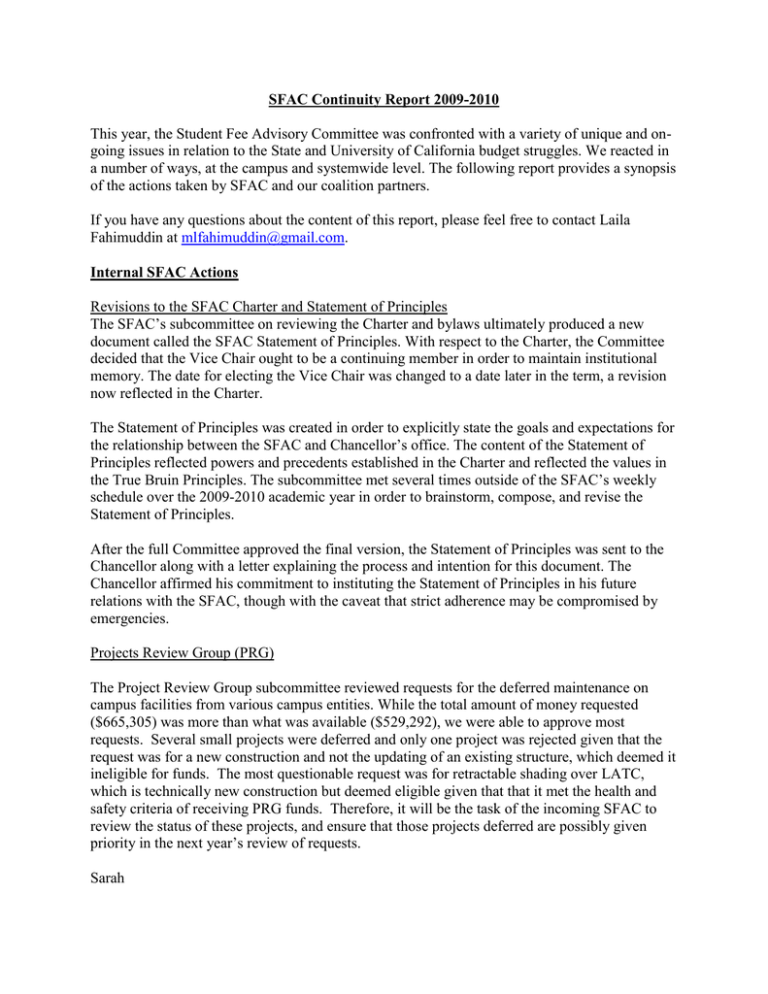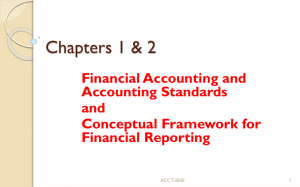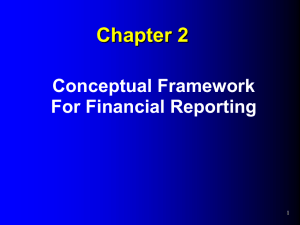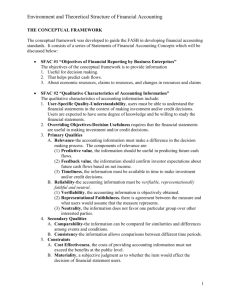2009-2010 Continuity Report - UCLA Student Fee Advisory Committee
advertisement

SFAC Continuity Report 2009-2010 This year, the Student Fee Advisory Committee was confronted with a variety of unique and ongoing issues in relation to the State and University of California budget struggles. We reacted in a number of ways, at the campus and systemwide level. The following report provides a synopsis of the actions taken by SFAC and our coalition partners. If you have any questions about the content of this report, please feel free to contact Laila Fahimuddin at mlfahimuddin@gmail.com. Internal SFAC Actions Revisions to the SFAC Charter and Statement of Principles The SFAC’s subcommittee on reviewing the Charter and bylaws ultimately produced a new document called the SFAC Statement of Principles. With respect to the Charter, the Committee decided that the Vice Chair ought to be a continuing member in order to maintain institutional memory. The date for electing the Vice Chair was changed to a date later in the term, a revision now reflected in the Charter. The Statement of Principles was created in order to explicitly state the goals and expectations for the relationship between the SFAC and Chancellor’s office. The content of the Statement of Principles reflected powers and precedents established in the Charter and reflected the values in the True Bruin Principles. The subcommittee met several times outside of the SFAC’s weekly schedule over the 2009-2010 academic year in order to brainstorm, compose, and revise the Statement of Principles. After the full Committee approved the final version, the Statement of Principles was sent to the Chancellor along with a letter explaining the process and intention for this document. The Chancellor affirmed his commitment to instituting the Statement of Principles in his future relations with the SFAC, though with the caveat that strict adherence may be compromised by emergencies. Projects Review Group (PRG) The Project Review Group subcommittee reviewed requests for the deferred maintenance on campus facilities from various campus entities. While the total amount of money requested ($665,305) was more than what was available ($529,292), we were able to approve most requests. Several small projects were deferred and only one project was rejected given that the request was for a new construction and not the updating of an existing structure, which deemed it ineligible for funds. The most questionable request was for retractable shading over LATC, which is technically new construction but deemed eligible given that that it met the health and safety criteria of receiving PRG funds. Therefore, it will be the task of the incoming SFAC to review the status of these projects, and ensure that those projects deferred are possibly given priority in the next year’s review of requests. Sarah SFAC Website Motivated by SFAC's goal to increase transparency and general understanding of fee related issues among students and the general campus audience, a small project group decided to update SFAC's website during the Winter quarter. Three members (undergraduate, graduate, and administrative representative) designed an entirely new website that incorporporated feedback of previous and all current SFAC members and focuses on explaining the work of SFAC, current projects, and the intricacies of all student fees. Elements from the previous website were incorporated into the new structure, such as the SFAC continuity report, an overview page of all currently serving SFAC members, as well as important links and a list of commonly used acronyms. The project group also made suggestions to establish a list of frequently asked questions (FAQ's) on the website and incorporate a blog function to better interact with campus members. This was supported by the general committee and implemented in the new design. The new SFAC website went online at the end of Spring quarter and can be found under the new URL: www.sfac.ucla.edu. Ray SFAC Student Service Compensation Policy The Compensation Policy Review subcommittee took on the task of reviewing the SFAC Student Service Compensation Policy. The subcommittee consulted with the chairpersons and advisors of the committees included in the policy: Campus Programs Committee (CPC); Community Activities Committee (CAC); Campus Retention Committee (CRC); Student Initiated Access Committee (SIAC); and Student Health Advisory Comittee (SHAC). Each of these committees participated in describing, assessing, and evaluating in detail several aspects of their committees. The subcommittee, in evaluating the work performed and services provided by these committtees, looked primarily at three factors: 1) time required for participation inside and outside of regular committee meeting time(s), 2) Gravity of responsibility and scope of interaction and impact on the general campus community, and 3) Size of budget reviewed, including any recent changes. Recruitment or retention was not considered a factor, as this is largely the responsibility of the student governing bodies that make committee member appointments. Following this evaluation, the committee recommended increasing the compensation per student member of the Campus Retention Committee and the Student Initiated Access Committee to $2,750 per year. In order to accommodate these increases, the SFAC also recommended increasing the annual student compenstation budget that falls under the Student Service Compensation Policy from $102,500 to $111,500. These recommendations were approved by Chancellor Block in May 2010. Budget Impact Questionnaire In light of furloughs, and Budget cuts prior to the 2009-10 academic year, SFAC took it upon itself to conduct a review of the current status of Reg fee funded units. Since SFAC had already conducted a thorough review of these Reg fee funded units in 2008-09, a small questionnaire was conducted in order to determine if emergency funding was necessary. The short questionnaire was drafted by the Unit Review subcommittee which consisted of 2 undergrads, 3 graduates and 1 staff representative. The questions were: 1. In general, with recent budget changes, have there been any changes in your service options and level of delivery? Have you been able to maintain the quality of your service and serve the same number of students? a. Explain how you are managing recent changes in fund levels from all of your fund sources for 2009-2010. 2. How have your long term plans and goals been affected by changes in funding levels? How are you planning to stay on track to meet your long term goals? 3. Do you have service and/or productivity metrics? If so, how do you utilize them? 4. Have you been able to mitigate reductions in staff time due to furloughs with technology (ex. reduction in staff office hours with virtual counseling or extended phone hours)? If so, has it been effective? 5. Has the original usage intent for your Registration Fee funds changed over time? After thorough review and consideration SFAC did not vote in favor of distributing emergency funding to units for the 2010-11 academic year. However, the 2009-10 SFAC strongly recommends for next year’s committee to make a comprehensive study of how the committee can deal with budget shortfalls that sure to come in the future. Campus Outreach Due to the mid-quarter fee hike students began to question their representation on budgetary issues, as a result the vice-chair contacted the Daily Bruin to feature an article on the role of SFAC (Winter Quarter), since one of the responsibilities of the vice-chair is to serve as the liaison to the Daily Bruin. The article was featured on the front page of the Daily Bruin which contained up to date information of SFAC’s current relationship with administration as well as to responsibilities of the committee. In addition, the article posted the time and date of weekly office hours which SFAC implemented during Winter Quarter to answer any questions students had. The Daily Bruin article was one of the outreach methods SFAC implemented this year in hopes of becoming more visible on campus. This year SFAC created office hours in response to inquiries made by students who felt the need to have more representation on student fee hikes. Office hours were implemented during Winter Quarter, however because of the lack of student attendance they did not continue on through Spring Quarter. The office hours were a great step forward to increase transparency on campus, unfortunately our outreaching methods were not successful. Next year it will be good to keep in mind the necessity to have on a presence on campus. Therefore, different methods of outreach such as a blog on the SFAC website, having office hours in a more ideal location, or having fliers placed throughout the campus are good methods to look into. Ongoing campus issues Pauley reconstruction and Student space capital planning During Summer 2009, the Chair was notified by Student Regent Jesse Bernal that there was concern regarding the use of student fees in funding the multi-million dollar project to renovate Pauley Pavillion. After consultation with the Chief Financial Officer, the Chair was assured that while student fees were being used, it was with the consent of the appropriate student governance boards. In Spring 2010, there was an article by the LA Times stating this was an inappropriate use of student fee reserves. It was then made clear that the student governance boards were not notified, and the plan was revised to exclude SPARC fee funds. The final project came in at a $135M bid, to be funded through donations, Athletics and Seismic/Safety fee reserves. This process sparked discussion regarding the ongoing discussion regarding the need for expanding student space for meeting, office and programming space. In a meeting with the VCSA, Director of CRA, the CFO, AVC of Capital Projects and representatives from GSA, USAC, SFAC, ASUCLA BOD, SACBOG and JWBOG, it was decided that with the large SPARC reserves and the pressing need for space, plans should begin to update UCLA’s capital projects plan. The working group will begin to meet this summer, Summer 2010, and the 20092010 SFAC Vice Chair will serve as the SFAC representative to this group for the following academic year. Student Affairs reorganization Student Affairs has had ongoing discussion regarding reorganizing units within the organization. Do date, this has occurred internal to the Executive Management Group. After several meetings, it was decided that the state of the plan is at a phase where it would be constructive to have SFAC student representatives included for feedback with regards to approaching the reorganization and restructuring process. The incoming SFAC Chair will serve as liaison to this working group, beginning this summer. Student Mental Health Funding UCLA has not yet pursued fulfilling the Tier 3 items on the Student Mental Health Initiative charge. With a considerable temporary funding carryforward and some potential areas of concern for units that may qualify within SMHI funding requirements, this committee recommends that the incoming committee critically examine the needs of units that qualify for SMHI temp funds for emergency funding as student mental health and support needs become increasingly important in this difficult climate. UCRP/Benefits As the Chancellor urged, SFAC voted to approve temporary funding for UCRP/benefits costs for Registration Fee Funded employees. However, given the fact that Reg Fee has not increase in the last fee increase round and costs have increased exponentially with the high cost of UCRP and benefits, this committee strongly urges the incoming committee to review all Reg Fee funded units for any potential undedicated carryforwards or other funding efficiencies to see if the units can partially cover their URCP/benefits costs. This committee also recommends that the incoming committee examine projections on the increasing costs of UCRP/benefits to consider if SFAC should continue to fully fund increases or to partially cover and leave the remainder as a cut. Course Material Fees This year, SFAC saw an interesting revision to the UC Course Materials and Services Fee policy. UCOP presented a revised policy in October 2009 that includes the cost of temporary faculty, highly specialized instructors, and staff providing general instructional support. This places the cost of staff salaries and benefits on an individual course fee. The Course Materials Fee as previously prohibited funding staff. This sets a concerning precedent that was raised when a a department requested a dramatic fee increase to cover a staff member. The committee advised the Chancellor to reject this increase. We encourage the incoming committee to remain vigilant regarding this issue, and to consider a report examining the cost burden of Materials fees to students to see if it differentially impact science and engineering students. This was a recommendation from the 2009-2009 committee that this years committee was unable to pursue. Ongoing system-wide issues GSHIP collectivization This year there was a proposal by UCOP for a UC-wide GSHIP plan for the upcoming academic year (2010-11) for all eleven UC campuses (including Hastings). UCLA along with four other UC campuses declined to commit to this UC-wide plan. The administration, GSA, and SHAC felt that the UC-wide plan would not be as beneficial for the graduate population, because graduate students would actually pay a larger sum of money for fewer services. Since UCLA provides a high quality of health services this UC-wide plan would not be as beneficial to UCLA graduate students. It is important to note that GSA is no longer part of UCSA and as a result SFAC was unable to receive up to date information. Also, a new workgroup was formed for the subsequent phases which will allow for an increase of student representation. In addition to Monroe Gordon, Ashe director JoAnn Dawson, M.D. and Jamal (the GSA president) were also representing UCLA; however, because they are not participating for the 2010 to 2011 year, they will not have voting rights. SHAC will closely follow this issue in the future. There are also talks of implementing a UC-wide SHIP for undergraduates. The incoming vice-chair should follow up on this discussion next year. Registration Fee Task Force As a follow up to past Student Regent Scorza’s Registration Fee Report, the Registration Fee Task Force was commissioned to examine transparency and policy issues regarding the registration fee. The body consisted of VCSAs, Budget A/VCs, EVCs and student representatives from UCSA, CSF, and UC Berkeley. The task force was successful in establishing online transparency at all campuses, renaming the fee to the Student Services Fee, and redefining the policy and creating Regental guidelines. Key highlights from the new policy/guidelines is that is places a 33% return-to-aid component on any future SSF increases, and it both expands and contracts the scope of units that SSF may or may not fund. This is an area the incoming committee should closely monitor as there will be interest to move units traditionally prohibited from RF funding to be covered partially by the SSF. The new policy, guidelines and name were approved by the Regents at the May 2010 meeting. UC Commission on the Future In response to the drastic cuts in state funding to the University, Regent Gould and President Yudof commissioned the CoF, which is charged to re-examine how the UC approaches it’s mission. There were 5 groups formed, consisting of professors, business professionals, Regents and one student. The groups were to focus on Size and Shape, Access and Affordability, Education and Curriculum, Funding Strategies and Research Strategies. Some proposals include tiering fees by campus, by major, by year; creating an online UC for GE classes; merging the Education Fee and Student Services Fee and calling it Tuition; renaming the Education Fee to Tuition; amongst other proposals. The Commission is expected to present final recommendations to the Regents by Early Fall. SFAC needs to closely monitor this as many issues critically effect us as a committee and as students. Professional Fees There has been discussion of different methods to professional fees. One proposal is to implement professional fees for academic doctorates. Another is to de-couple the rate of professional fees from state university averages to the open averages. There is not too much information on these issues to date, but are critical for SFAC to monitor. Council on Student Fees The Council on Student Fees was very efficient this year. We worked towards getting UC Merced’s SFAC a charter, as it is currently operating under a charge memo by their VCSA, leaving their identity very amorphous. We also worked on campus outreach to raise awareness of what SFACs are and awareness around student service and greater budgetary issues. The result varied by campus based on their relationships with their campus media outlets. The major issue we worked on was shaping the new Student Service Fee policy and guidelines as much as we could to keep it student friendly. We felt that we were fairly effective in this process, although we did not get all that we pushed for. Nonetheless, it was a productive year for CSF. We also put on a very well received workshop on the UC budget and fees at UCSA’s Student Lobby Conference, which is an activity we hope to continue.




